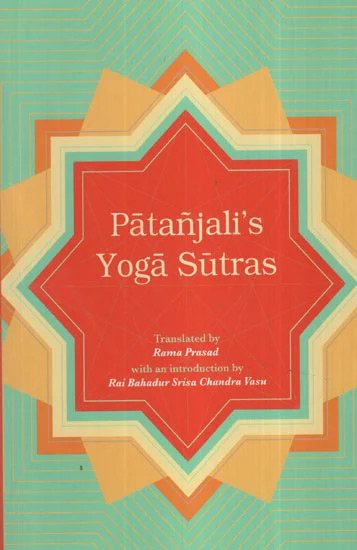Yoga-sutras (with Vyasa and Vachaspati Mishra)
by Rama Prasada | 1924 | 154,800 words | ISBN-10: 9381406863 | ISBN-13: 9789381406861
The Yoga-Sutra 1.50, English translation with Commentaries. The Yoga Sutras are an ancient collection of Sanskrit texts dating from 500 BCE dealing with Yoga and Meditation in four books. It deals with topics such as Samadhi (meditative absorption), Sadhana (Yoga practice), Vibhuti (powers or Siddhis), Kaivaly (isolation) and Moksha (liberation).
Sūtra 1.50
Sanskrit text, Unicode transliteration and English translation of Sūtra 1.50:
तज्जः संस्कारोऽन्यसंस्कारप्रतिबन्धी ॥ १.५० ॥
tajjaḥ saṃskāro'nyasaṃskārapratibandhī || 1.50 ||
tajjaḥ—born therefrom, saṃskāraḥ—residual potencies, impressions. anya—other. saṃskāra—residual potencies, impressions. pratibandhī—impeding.
50. Residual potencies born therefrom impede other residual potencies.
The Sankhya-pravachana commentary of Vyasa
[English translation of the 7th century commentary by Vyāsa called the Sāṅkhya-pravacana, Vyāsabhāṣya or Yogabhāṣya]
[Sanskrit text for commentary available]
When the trance cognition has been reached, the Yogī acquires by the exercise of that cognition, newer and newer residual potencies. ‘The residual potencies born therefrom impede other residual potencies.’ The potency born of trance impedes the outgoing vehicle of potencies. By overpowering the outgoing tendencies, notions due to them cease to exist. On the suppression of these notions the trance faculty gains in power. Then again the activity of trance cognition. Then again residua caused by the act of cognition. In this way the vehicle of potencies is being constantly renewed.
Well the act of cognition is caused by the potency and the potency is caused by the act. How is it then possible that the mind may not be given by this vehicle of potencies an object in itself? The potencies born out of the trance cognition do not give die mind a duty to perform with reference to themselves, because they are the cause of the removal of the afflictions. They bring about the finishing of the duty which the mind has to perform. It is only up to the attainment of discriminative knowledge that the activity of the mind has to last.
The Gloss of Vachaspati Mishra
[English translation of the 9th century Tattvavaiśāradī by Vācaspatimiśra]
Let that be. The cognitive trance has the reality of an object for its sphere of operation. Practice and the other means of restraint as described, are however outgoing potencies. The trance cognition is known to be firmly bound up with them. They must therefore be obstacles to the full realization of that state of consciousness, shine as it would like atomic twinkles of light in the midst of a hurricane. To remove this doubt the commentator introduces the aphorism ‘When the trance cognition has been reached, &c.’ Reads the aphorism:—‘Residual potencies born therefrom impede other residual potencies’.
The word, ‘there’ in ‘therefrom’ signifies the ultra-meditative thought-transformation. ‘Other’ means the outgoing. Inclination towards the realities of objects is of the very nature of the mind. It is unsteady and wanders only so long as it does not reach the reality. When that is reached it takes up a steady position, and turns round and in the way of the wheel of potency, bent (i.e., upon purification upon acquiring that potency). Doing this it must certainly impede the mutual succession of the power and act of the cognition of unrealities, although the succession has had no beginning. The outsiders also say the same:—‘Unreal cognitions do not contradict the nature of the objects as they do exist in reality, free from defects, even though the unrealities have existed from eternity; because the mind is naturally inclined towards the realities.’
Very well, grant that the outgoing potencies are restrained by the operations of the trance cognition. But the first manifestation of the trance cognition has for its final object the ever-increasing unchecked manifestation of the potency of trance cognition. Thus it is plain that the mind even in that state, has the same old quality of having still a function to perform. (The attainment of the trance cognition too does not take it any rearer to the fulfilment of its object). This is the question raised ‘How is it then that the mind, &c.’ Refutes:—‘The potencies born out of, &c.’ There are but two objects of the mind, the enjoyment of sound, &c., and the attainment of Discriminative knowledge. Of these the enjoyment of sound, &c., comes into operation with the existence of the vehicles of affliction and action. When, however, the power which springs from the manifestation of trance cognition, entirely roots out the vehicles of action and affliction and the mind for that reason exists in the state of having mostly fulfilled its objects, the only object that then remains for it to achieve, is the attainment of Discriminative knowledge. Therefore the potencies of the mind due to the practice of the trance cognition cannot generate the habits of returning to the duties of enjoyment. They must check their forward march. They bring about the end of its duty of enjoyment, i.e., render it impotent to enjoy them. How? The action of the mind lasts only up to the attainment of discriminative knowledge. The mind only works for enjoyment as long as it does not experience discriminative knowledge. When, however, discriminative knowledge is born, the afflictions are removed, and the duty of causing enjoyment is over. This is the meaning.—50.
